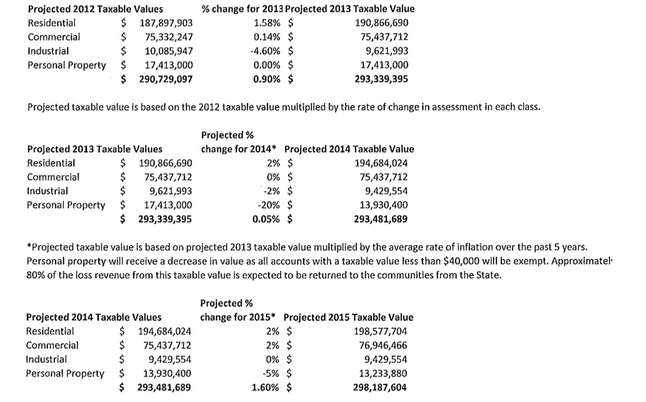SEMCOG report: $2M in additional cuts, revenue enhancements needed to keep Ypsilanti solvent
The Southeast Michigan Council of Governments is recommending Ypsilanti implements an additional $2 million in cost reductions and revenue enhancements across all funds beyond the level spelled out in the city's five-year budget plan.

SEMCOG is recommending Ypsilanti find $2 million worth of cuts and revenue enhancements.
AnnArbor.com file photo
A report sent by Dave Boerger, SEMCOG Fiscal & Operational Consulting Services representative, outlines several recommendations the organization made to the city in order to reach that $2 million goal.
"We also believe concurrently the services to your citizens can be improved or at a minimum, not deteriorate by these recommendations," Boerger wrote in the report to City Manager Ralph Lange.
SEMCOG completed the report in December at the request of Lange, after a month and a half process of its staff working to examine the city's finances and departments.
"Each one (recommendation) kind of stands on its own," Boerger said. "The real benefit is it generates the necessary funds to build their capital improvement funds. They haven’t been able to spend perhaps what they should have because they didn’t have those funds."
Water Street debt should be monitored
SEMCOG stated that Ypsilanti's largest financial gap to other comparable communities is its debt load from the Water Street redevelopment. Ypsilanti must pay $30 million on its Water Street bond debt and continue to make payments through 2031.
"The Water Street debt is probably the biggest areas of challenges that’s facing the city," Boerger told AnnArbor.com. "But it is part of the city and as the economy improves, it hopefully will be developed and we’ve encouraged them to enhance their efforts to develop it. Hopefully that will pay dividends to the city as that area is developed."
SEMCOG said the city is currently in the process of trying to address the Water Street debt load via its consultant Kirk Profit from the Governmental Consultant Services Inc. The city is seeking to restructure its debt and reduce its interest rates. SEMCOG believes this may reduce the current "breakeven" amount of $400,000 per acre.
Staffing, wage and benefits issues must be addressed
Personnel costs represent the next largest gap versus comparable communities, according to SEMCOG, but this is due to wage and benefit costs instead of the actual number of employees.
"With this shortfall in personnel, it is highly unlikely that Ypsilanti will be able to sustain the level of services your citizens expect," Boerger wrote.
The city has seen a decrease in its staff levels. As of Jan. 1, the city has 81 full-time employees, six part-time and 10 interns.
In 2012, the city lost 15 employees who either retired or resigned. Altogether, those employees wages amounted to $1,030,374. Thirteen of those 15 employees were unionized employees from the police and fire departments.
The city has since hired four employees, three in police and Lange, who amount to a total of $218,705 in wages.
SEMCOG recommends the city expand upon the proposed hiring in the five-year plan and supplement it with the utilization of part-time employees, interns and contract retirees for specific or short-term projects.
SEMCOG noted that union negotiations may be required to permit such use of employees and cautioned the city to be careful to limit hours to less than 30 per week to avoid mandatory benefits outlined in the Affordable Patient Care Act.

SEMCOG said city employees continue to be a large expense on the city's payroll.
Tom Perkins | AnnArbor.com file photo
"The Affordable Patient Care Act interpretation is evolving," Boerger said. "As things are maturing, that criteria changes. Bottom line is if they can supplement existing employees with part time and keep them under the threshold, then the costs are significantly lower.
"With the economy being the way it is, there are people looking for employment that would be willing to work for under 30 hours a week with no benefits," Boerger said. "Maybe their spouse is working and has benefits. ... There are all types of opportunities the city could take advantage of."
While the city is in the process of changing employee benefits, SEMCOG wants the city to take advantage of the hiring of new employees to set the tone for how new benefits packages should look. One proposed change the city is looking at for employees hired after Jan. 1 is no health benefits for the family or spouse of a staffer.
SEMCOG also is suggesting that for unionized employees, such as those within the police and fire departments, the city should expand the two-tier wage and benefit packages by limiting them to 30 percent below the maximums for existing employees. SEMCOG believes cost savings would be reflected and accrue over time as new hires begin to replace retiring or departing employees.
However, for existing city employees, SEMCOG isn't suggesting any wage and benefit cuts or layoffs.
"Elevating your best part-time employees to full time also represents an effective practice to better assure the employees meet your expectations," Boerger wrote.
Lange mentioned during the Tuesday, Jan. 8 city council meeting that legacy costs continue to be an issue for the city. SEMCOG agrees and is urging the city to reduce its legacy costs by negotiating with retirees not on Medicare to sign up and convince all of the city's 119 retirees to convert to the Medicare Part D prescription coverage.
More economic development is needed
Boerger said economic development for Ypsilanti is critical to its long-term success. Economic development could spur an increase in property taxes as well, according to Boerger, improving the city's finances.
"This is a common dilemma with a lot of our cities," Boerger said. "The city's revenues cannot increase more than the rate of inflation. Economic development is such an important part of enhancing a community's revenue."
See the chart for the city's expected property tax projections through 2015:

Boerger said more economic development would impact the revenue generated by the city's property taxes.
Courtesy City of Ypsilanti
By 2017, the city is expected to have a projected taxable value of $306.5 million, a 1.75 percent increase from the 2016 expected total of $301.2 million.
"(The city can) get additional revenue from the tax revenue of new developments and also get an enhanced feeling of community spirit associated with growth, new jobs and it just builds on each other," Boerger said.
SEMCOG noted the city has seen success with the recent openings of "trendy" businesses such as Red Rock Downtown Barbecue and development projects like the $1 million expansion and energy effort at Corner Brewery.
"It's just a self-fulfilling kind of effort that happens," Boerger said. "I think Ypsilanti has enough capabilities, especially with the university and Water Street development and the history of the city to do that under this administration and city leaders."

Wurst Bar is one of many recent businesses to open in Ypsilanti.
AnnArbor.com file photo
Continuing to pursue the Amtrak Wolverine stop and commuter rail stop in Depot Town also could spur more economic vitality for the city, according to SEMCOG. Demonstration trains stopped through Depot Town last November.
"Expedite discussions with SEMCOG, MDOT and the MEDC for the development of Ypsilanti 'event service' on the commuter rail line and complete the analysis of incremental Amtrak ticket revenues for travelers between Ypsilanti and stops," Boerger wrote.
Boerger said while the city is facing serious issues, he is confident the city is on the right path.
"I'm confident that they'll figure out which of the recommendations that we recommended they'll pursue based on feedback from staff, council and citizens," Boerger said. "Just the fact that the city council decided to bring in Ralph Lange, they recognize the serious situation and addressed it."
Katrease Stafford covers Ypsilanti for AnnArbor.com.Reach her at katreasestafford@annarbor.com or 734-623-2548 and follow her on twitter.


Comments
Markus
Thu, Jan 10, 2013 : 9:53 p.m.
Great analysis. Good to see that the right types of things are finally being looked at. Good work, SEMCOG.
Alan Goldsmith
Thu, Jan 10, 2013 : 4:53 p.m.
I certainly hope the elected officiasl toss this clown out of the front door. To encourage dodging the roll out of national health care by ramping up the process for hiring part time employees is no better than Papa Johns or Red Lobster or other corporations intent on torpedoing health care. SEMCOG: who runs this organization anyway, the Tea Party?
maallen
Fri, Jan 11, 2013 : 12:24 a.m.
These part time workers will have coverage through the healthcare exchange, and because they won't be making that much money the federal government will be paying their insurance IF they buy it through the healthcare exchange. Sounds like a sweet deal, eh?
JRW
Thu, Jan 10, 2013 : 6:12 p.m.
Exactly. No one is forcing any company to move people to part time or to start hiring part time over full time employees. That is the decision of the company or organization NOT to offer health care to its employees, which is despicable, by the way. The public should be blasting companies that do this, not Obamacare. The ACA will provide coverage to millions who don't have it. Businesses that scam the system and force employees into private insurance to avoid offering benefits are the lowest of the low,regardless of who they are.
leaguebus
Thu, Jan 10, 2013 : 3:36 p.m.
The gold and platinum benefit packages are for workers like police and fire professionals that have very strenuous jobs. How many 65 year olds do you know that can strap on 70 pounds of equipment and climb a 30 foot ladder several times at a fire? When these people cannot physically do the job anymore, most cannot move to a less strenuous one in the administration. So why would anybody take a job like that? Benefits.
Markus
Thu, Jan 10, 2013 : 9:52 p.m.
Yep, and that reasoning is fine. The best way to find out exactly what people would take,is to renew the contracts and see what price the market sets for this type of service. However, the defined-benefit approach is not sustainable anyways, so if it is what is required, we will not have firemen and policemen for long. As it is, defined-benefit packages are putting firemen and policemen out of work, because the legacy costs of services provided long ago are sucking all the cash out of the piggybank, so the only choice is just to axe current employees. 401k is what everyone else has (if they are lucky), so F&P can handle that too - unless they are too elite, and must live off the backs of people making less than half what they do. Ypsi is not a wealthy town.
JBK
Thu, Jan 10, 2013 : 1:17 p.m.
This little nugget is just too good not to share! And I quote: "The Affordable Patient Care Act interpretation is evolving," Boerger said. "As things are maturing, that criteria changes. Bottom line is if they can supplement existing employees with part time and keep them under the threshold, then the costs are significantly lower. So let me get this straight. ObamaCare is going to force Municipalities to cut back and hire part-time workers with NO benefits instead of f/t with benefits. Too friggin funny! :)
YpsiKris
Fri, Jan 11, 2013 : 5:32 p.m.
This problem (keeping employees "part time" to avoid providing coverage) existed well before Obamacare for any organization that had the policy of providing health insurance to full time employees. So I have a question: before Obamacare did ypsi offer health insurance to all full time employees? If so the quote is blaming Obamacare for an issue it would have had well before the law.
MGoYpsi
Thu, Jan 10, 2013 : 5:49 p.m.
Maybe those that retired at age 50 with that sweet deal from the city would come back part time.
Katrease Stafford
Thu, Jan 10, 2013 : 2:30 p.m.
JBK, Interesting that you brought this up. What are your thoughts on what Boerger said here: "With the economy being the way it is, there are people looking for employment that would be willing to work for under 30 hours a week with no benefits." Do you think there would be people willing to work in the city despite possibly not having healthcare provided by their employer?
maallen
Thu, Jan 10, 2013 : 2:21 p.m.
But wait! I thought ObamaCare was going to help us individuals and families? I think people are slowly waking up and realizing how detrimental ObamaCare is to not only our economy, but also to individuals and families.